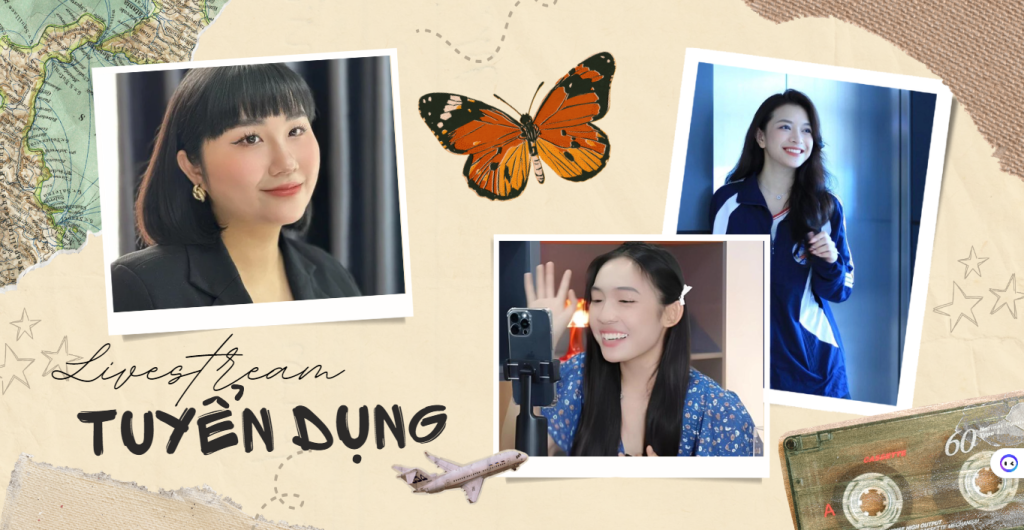What to do when your idol is involved in a scandal: Lessons from actor Lee Sun Kyun and Tun Phạm
This video is based on the version from December 30, 2023, and has not been updated regarding Tun Phạm’s incident.
The article was drafted on December 30, 2023, with an update about Tun Phạm’s incident on February 22, 2024. Please scroll to the bottom to read about Tun Phạm.
Check out part 2: What to do when your idol is involved in a scandal (part 2) – Permission to neatly store away posters of Thắng (Ngọt band), Nhã Nam publishing company, actress Han So Hee, and actress Nam Em into the corner.
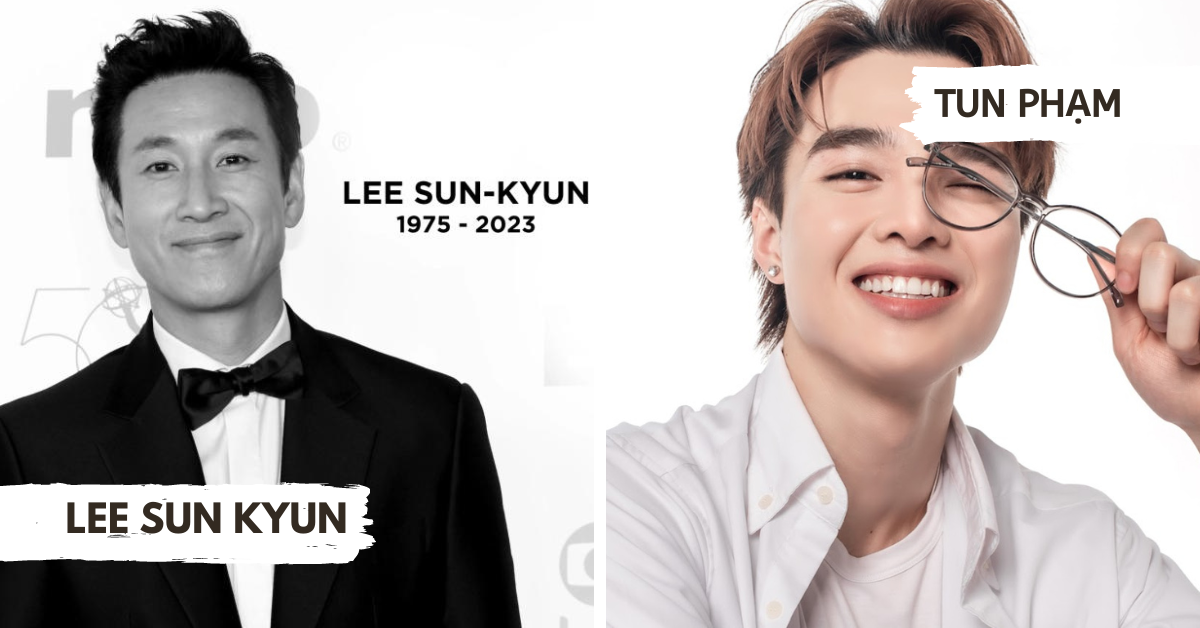
“Pity the fate of a talented yet ill-fated person,” that’s what I thought when I read the news of “Parasite” actor Lee Sun Kyun ending his own life after the scandal involving drug use and infidelity.
THE ROLE OF MEDIA AND “HALF-TRUTH”
When an idol gets caught in a scandal, a common thought from readers is: “There’s no smoke without fire.”
In October 2023, news outlets began reporting on actor Lee Sun Kyun being involved in a drug scandal. Both rapid and in-depth drug tests on Lee Sun Kyun came back negative. During the investigation, Lee Sun Kyun claimed he “snorted powder through a straw, thinking it was a sleeping pill.” The public found his statement laughable until he committed suicide by carbon monoxide poisoning in his car. Numerous news outlets expressed sorrow over his passing. At the end of their articles were links to other related pieces, such as “Korean media reveals suicide note of the actor” (despite the family requesting it be kept private), with SEO-friendly (Search Engine Optimization) headlines, accompanied by hashtags like #leesunkyun and others to help readers follow the story. Following that were headlines about what others were saying about the actor, articles analyzing the reasons why the actor was driven to his death, and other related information. This spiral of information kept circulating, eroding the artist’s spirit from the moment everything was just a rumor, mocking his testimony, only to later cite that same testimony after the famous actor passed away. The media continued to draw tears from readers with articles analyzing who was at fault when the actor chose such an extreme path to end his pain. Because views are KPIs, KPIs are money, and money rules all.
Who is to blame? The cruel netizens who disregard the privacy of celebrities? The Korean law enforcement agencies, who, instead of opting for a private investigation, deliberately made the case public because it involved a prominent figure, drawing public attention? Or is it humanity’s addiction to dopamine, craving drama and scandals so that the media must sensationalize headlines to feed the attention economy?
Neither the public nor the Korean authorities have learned from the recent case of G-Dragon and his drug allegations. Countless words were written, and the management company immediately distanced itself. Yet, no one expected that the “King of K-pop” would make a remarkable comeback against public opinion with negative results from hair and nail tests, without any hair dye or bleaching to destroy evidence, and his “charmingly rebellious” attitude, concluding with a community-driven action by establishing a fund to support those recovering from drug addiction.
This made the intellectual community wake up and question whether we’ve become too engrossed in the media, where every word, detail, and action of influential people can be distorted and sensationalized. The press teaches students to write objective truths, but where are these objective headlines today? Where is the truth? And where is justice when people like Lee Sun Kyun have to pay with their lives to clear their name under the pressure of public opinion?
THE PRICE OF FAME
The benefits of fame are wealth and recognition. The downside of “wealth and recognition,” according to research by Professor of Marketing Marlene Morris Towns at Georgetown University, is being scrutinized and harshly judged by both experts and the public. The mental capacity to handle opposition and backlash is essential for creating a lasting celebrity. Those living in the spotlight often lose their privacy, live under the watchful eyes of the public, bear the pressure of maintaining a certain image, and sometimes face challenges in personal relationships. Many celebrities, in an attempt to escape harsh realities, turn to alcohol, sex, and substances as defense mechanisms. And many times, that is not enough because, at the core, it’s the cruelty of humankind. For attention and survival, people criticize what’s popular to “ride the fame” and bring others down to lift themselves up. The consequences are far from benign: Taylor Swift turned to alcohol when she experienced a “spiritual death” at 27 following the “snake” scandal with Ye and Kim Kardashian. Robert Downey Jr. faced jail time due to substance abuse after the glory of Hollywood. More tragically, actress-singer Sulli joined the “27 Club” at the age of 25. Last but not least, actor Lee Sun Kyun took his own life at 48, leaving fans in Korea and around the world mourning his loss.
GREAT TALENT, MANY FLAWS: UNDERSTANDING BUT NOT INDULGING
To quote the song Snow On The Beach by Taylor Swift feat Lana Del Rey:
“Life is emotionally abusive.”
Everyone needs a way to escape harsh realities. Sometimes it’s sleep, sports, food, pets, cigarettes, vaping, or sex. For celebrities under immense pressure, it’s often alcohol and substances.
I think the reason Tony Stark’s character became so successful is because Robert Downey Jr.’s life and experiences behind bars allowed him to easily empathize with Stark’s guilt and narcissism as the head of a weapons empire. One could say that without the addiction and jail time, the role of the “genius, billionaire, playboy, philanthropist” might not have been as iconic.
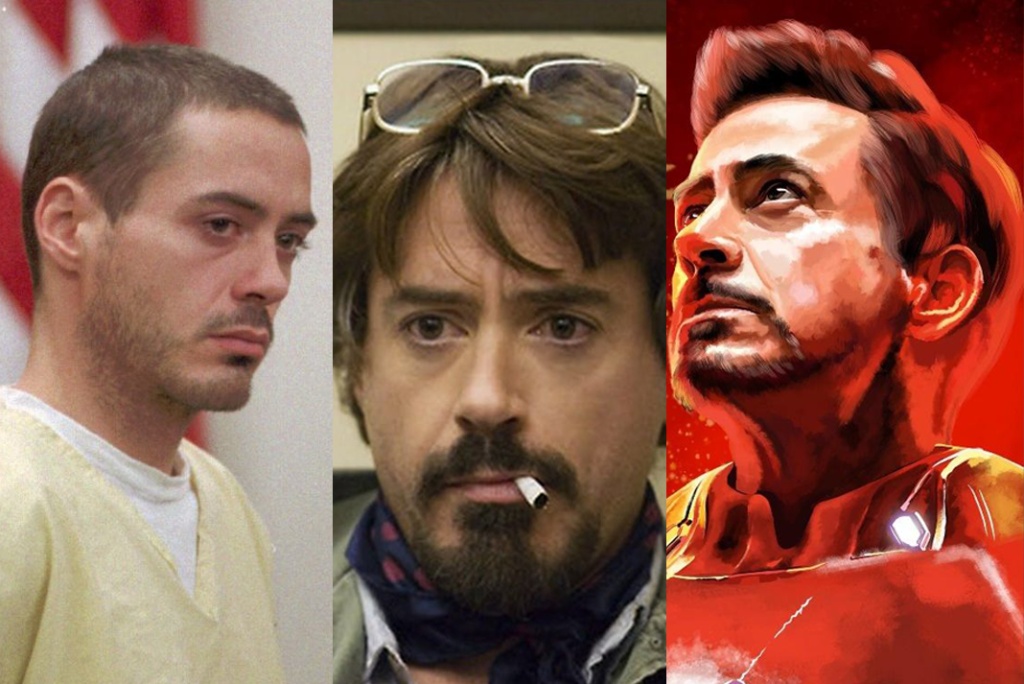

I bring up these examples not to suggest that we should support our idols 100% no matter their actions or attitudes, even when it comes to illegal activities like drug use or prostitution brokering. I want to point out: Where is the line between supporting and opposing an idol? “Understanding but not indulging” is my principle when an idol makes a mistake. If you agree, you can follow it. If it doesn’t resonate, I just hope you recognize this: Idols are also human, with pain and pressure like anyone else. Fans don’t need to idolize celebrities blindly when they face scandals, but they do need to have faith in those they admire, stay level-headed in the face of media tactics, seek out reliable, multifaceted information, and avoid imposing narrow traditional values and worldviews on their idols. Criminals will be punished by the law—there’s no need for netizens to use their intelligence and ChatGPT to “write up judgments.” Though it’s difficult, addictions can be overcome, those who are imprisoned can be released, and a person found guilty today could be proven innocent in the future. Everyone deserves a second or third chance, because before, during, and after being a public figure, they are still human.
ONLINE VIOLENCE – DON’T PUSH IDOLS TO THEIR DEATH
SHINee’s star Kim Jonghyun “faded away” by carbon monoxide poisoning on December 18, 2017, leaving behind his final words: “Fame was never meant for me.” He had a tattoo of the “black dog” – a symbol of depression.
Choi Sulli, the national muse of K-pop, hanged herself with a string of lights after being heavily criticized by Korean netizens for dating someone 14 years her senior, neglecting her group f(x) due to her relationship, promoting pedophilic ideas by posing with Lolita-like expressions, and going braless. She had cried for help by attempting to cut her wrists, but the public did not show her mercy.
The “living doll” Goo Hara is no longer in this world after being criticized for her promiscuous lifestyle, engaging in sexual relations before reaching the age of consent, showing disrespect towards her seniors, and taking photos that promoted pedophilic ideas alongside Sulli…
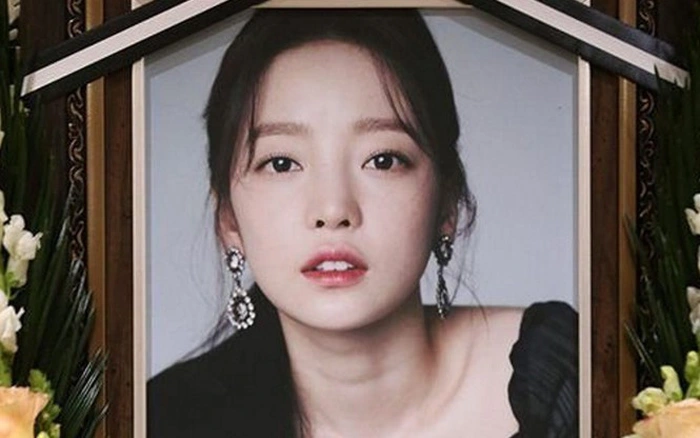
I wonder, while the “crimes” may vary in severity, what crime is serious enough to push someone to death like this?
(If you remember, Minh Béo, the famous comedian, after admitting to two charges of “sexual assault against minors and attempted lewd acts with a child under 14,” received an 18-month prison sentence and has since left prison to start a new life.)
I’m not defending Minh Béo, Robert Downey Jr., Seungri, or anyone else; I just hope you realize they are human and deserve a second chance to turn their lives around.
Dr. Kwon Hea Kyung, a Korean-American psychologist, remarked:
“South Korean society is not generous to those who make mistakes.”
South Korea has the highest suicide rate among 38 countries in the Organisation for Economic Co-operation and Development (OECD). In 2021, the government reported a suicide rate of 24.7 per 100,000 people in 2018. This is for ordinary people; for K-pop stars who have put in so much effort to gain fame, they are not treated as human beings. They are viewed as products, expected to always be beautiful, perfect, and constantly changing to entertain others like Barbie and Ken dolls from Korea, stripped of basic human rights like making mistakes, having relationships, and starting families. They are puppets of public opinion.
THE VALUE OF HUMANITY IS INEVITABLY INDISPENSABLE, WHERE IS THE LOVE?
Rapper Rhymastic painted a colorful picture of “keyboard heroes” in his song “When the Screen Turns Off“:
They are “the theorists, teenagers who only know how to rush to conclusions; they spare no one, dedicating their lives to judging strangers. And those who feel a bit of satisfaction just mock them for a while to ease their minds throughout the night, commenting some crude lines; Facebook users must be used to it, hiding their reality, reducing their own uselessness…”
Netizens have double standards; they are not perfect themselves but demand that celebrities be perfect for them, as they are famous and influential figures. They freely become “keyboard villains” to satisfy themselves, dissecting, mocking, and ridiculing celebrities, bringing others down to elevate themselves, to forget a little about their own sad reality, hiding behind fake accounts so no one can find them. They “type” as if it were a skill to put on their CV, only to later express regret in a few lines like, “I didn’t expect things to get this bad” when the pressure becomes too much and the person they love from afar chooses extreme ways to end their pain. Then, when a celebrity passes away, these self-proclaimed intellectual keyboard heroes will quote movies like “It’s a Wonderful Life” and “12 Angry Men” to ponder the value of a human life, not realizing that by then, it is too late.
Another newspaper commented on Lee Sun Kyun’s drug involvement: “Just being linked to drugs, regardless of the truth, has already ‘stabbed a knife’ that cannot be healed into the hearts of fans.”
Public sentiment is so fragile, easily shocked, easily stirred, and easily bewildered. A piece of news without clear facts is also “a knife that cannot be healed in their hearts.” So who will “heal” the pain from Lee Sun Kyun’s death?
Immanuel Kant, a German philosopher, noted:
“Human life is priceless.”
Yet life is inherently transient.
As a devoted fan of DBSK, I once hoped to attend a concert with all five members. However, after the historic lawsuit of JYJ against SM Entertainment, following Yoochun’s scandal of sexual misconduct and drug use, and all the ups and downs of the K-biz industry and life in general, I just wish the members to be alive and at peace. They don’t have to release music; they can start families if they want, marry the people they love, as long as they are happy. My wish is simply that, but sometimes, simple things are the hardest to achieve.
A comment on Spiderum about this article:
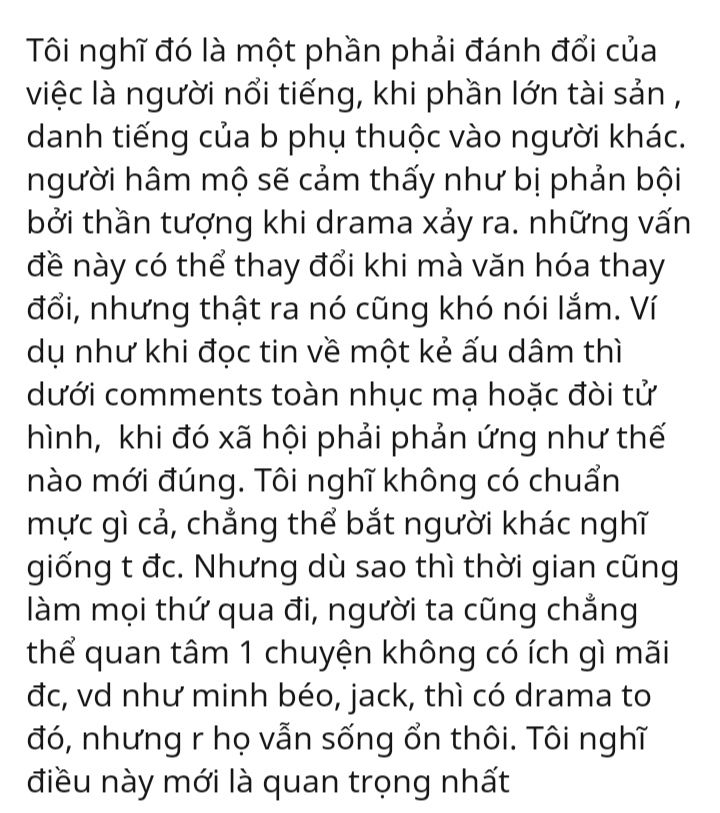
My response:
“Indeed, everything comes at a cost. You articulated very well that wealth and fame depend on others (I know this, but I’ve never phrased it that way).
It’s true that changing culture would help, but I think it’s very hard for society to change. For example, when young people’s explicit photos are leaked, most people will share the images and clips and laugh, saying how foolish it is. Only one person (a psychologist) suggests that if you take pleasure in this, then your ethics are questionable, and it should be deleted so that the individual is not psychologically affected later on.
Perhaps the answer lies in compassion, knowledge, and ethics.
Typing comments might be momentarily enjoyable, but 1,000 comments from 1,000 different people can take away not just one life.
There’s a very good book by Dr. Đặng Hoàng Giang on this issue called “Good, Evil, and Smartphone”; if you’re interested, you can check it out.
Your last section reminded me of the song “The Hottest News” by B-wine: “People will stop discussing because there’s always something like this on the front page.”
They may live fine, but what they do leaves permanent scars on the victims. So, is that okay? Or do you mean that the victims are still living well? I think that’s not quite okay.”
ABOUT TUN PHẠM AND THE SCANDAL IN THE BOOK “BECAUSE YOU ARE MY YOUNGER FRIEND.”
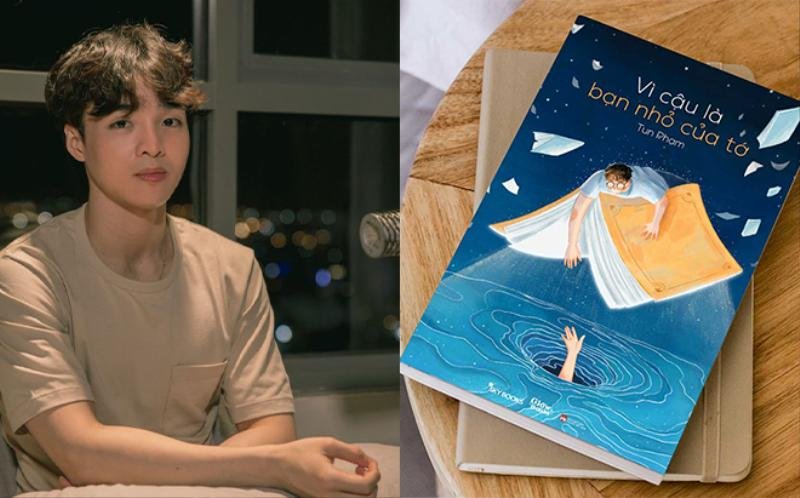
Tun Phạm is a content creator on TikTok (3.4 million followers), YouTube (219,000 subscribers), and a podcaster. Recently, he got involved in controversy for his disrespectful comments towards women due to the following excerpt from his debut book:
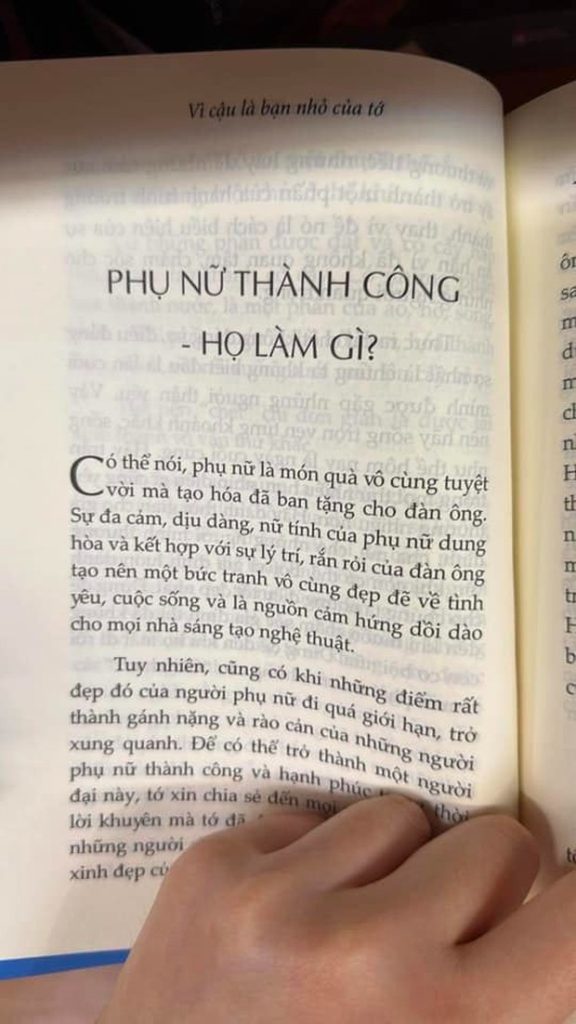
It is reported that the book has been reprinted four times, bringing the total number of copies published to 16,000.
I will write my remarks on this event as fairly and compassionately as possible for Tun Phạm.
I only know that if he is an alumnus of the Institute of Journalism and Communication, his book should have been better and deeper than what he has written.
Regarding the controversial excerpt, he focuses on explaining the term “gift” instead of addressing the specific issue of “giving to men.” Does that mean women who are happily single have no value?
My sister, who is currently 34 years old, is the primary breadwinner of our family. She supports me, suffers from schizophrenia, pays the utility bills for my parents, and currently lives on a meager pension of 5 million. Does that mean she has no value?
What about women who do not seek a partner? Do they have no value? Is it that they have no worth on their own? According to Tun Phạm, is their entire life meant only to serve men? Even in terms of makeup and how they dress?
And what about people in the LGBTQ+ community?
This perspective objectifies and disrespects women.
Moreover, as men, if they intend to advise women on what they should do, they must accept that public opinion will react strongly.
I have seen a few images of the book, and I would like to share them with the readers. Some keywords related to “Tun Phạm book pdf” have trended on Google, but out of respect for copyright, I will not download it. I will only quote the images I found online regarding his debut book:
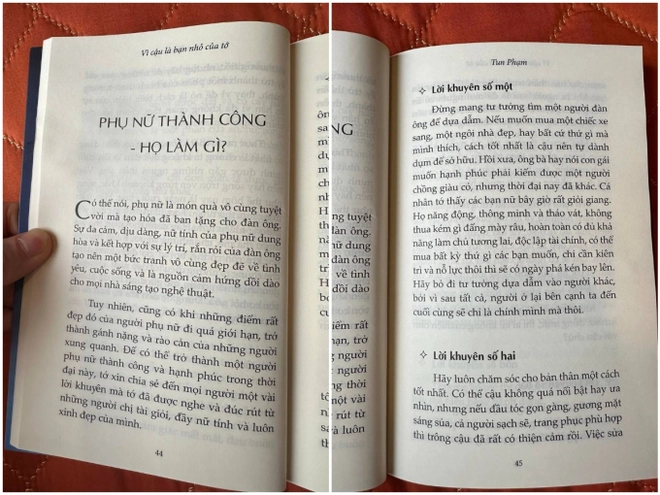
As you can see, Tun Phạm’s words are full of moralizing and quite imposing, reflecting his philosophy of living “for others.” “Always take care of yourself in the best way” to gain the “goodwill” of others? So does that mean during menstruation or when feeling tired, one must still look attractive? What is the point of saying that?
This mindset is also evident in the statement, “Then I ask myself, if my future partner were to look at my Facebook, or if my future partner’s family were to look at my Facebook, would everything be okay? Would they feel safe dating me? Then I question myself why so many people message me with negative content, and where that comes from.”
The reason is those individuals, not oneself, just like the cause of child sexual abuse and rape lies with the perpetrators who have psychological issues, not with the victims who may wear revealing clothing, my friend.
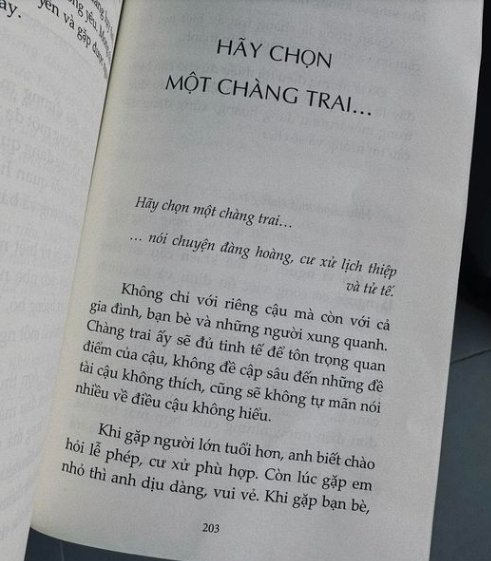
This way of thinking frames all the boys who deserve to be chosen into a box labeled “gentle.” I believe these notions are unrealistic.
Another excerpt:
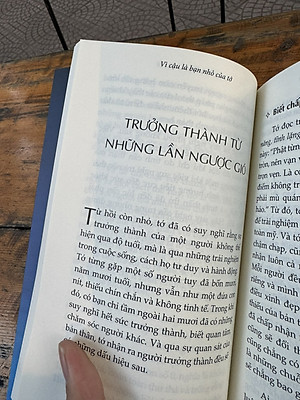
However, the language is very simple and lacks depth; perhaps Tun aims at an audience of middle or high school students. As a Gen Z, I wouldn’t buy this book, or if I did, I’d end up selling it secondhand.
What is the price of Tun Pham’s fame? According to his latest podcast titled “Each Year, Fixing Myself a Little,” that price is bipolar disorder and anxiety.
I understand Tun’s pressures, but a book must be polished to respect the readers. I know that as a public figure and an MC, Tun’s content must cater to the majority and state the “obviously correct” things. However, ChatGPT can do that; a person needs depth of soul, not to be empty and trite.
Currently, according to the Facebook page “S in Tun Pham means ‘Sáng tạo’ (Creativity),” the page owner always features a cover photo comparing Tun Pham to author Gào in the aspect of “garbage online literature.”
A piece of advice for Tun Pham: Your podcasts are visually appealing, but now they need to be more beautiful and deeper in content.
In the podcast “Each Year, Fixing Myself a Little,” Tun Pham mentions: “There are two types of people you meet in life. One category has a very low vibrational frequency. When you meet them, you’ll feel lust and what they call ‘ta dâm’ in Buddhism. Deep inside, I long to hug and kiss them, possess them, and I even desire to exchange my energy, which means to exchange my body with them. Those people have a very low vibrational frequency.”
It’s quite outdated to think like that in 2024, an era of sexual openness.
The publisher of this book, Glow Books, has issued an apology for using content that violates the copyright of author Lam. Specifically, six pieces of content in the “Reader’s Letters” section were taken from Lam’s works without permission. Regarding this issue, Glow Books stated: “Unfortunately, some of the content chosen for publication in the Reader’s Letters section is from the works of author Lam without permission. Specifically, in items 1, 2, 6, 7, 8, and 9. As this is a section of letters from readers, the production team was not meticulous enough in reviewing the content. This led to the inclusion of excerpts from author Lam in the book without clear sourcing.
This incident is truly something that no one on the production team wished for. Glow Books understands that this will upset both author Lam and his readers. Therefore, on behalf of the entire production team, Glow Books sincerely apologizes to author Lam and his readers. In future printings, as requested by author Lam, Glow Books will replace the duplicated excerpts with other letters from readers.”
Publishers like this need to be more careful about content when publishing books by celebrities. It’s not enough to just sell books based on a KOL’s follower count; they should avoid being careless with the writing itself.
The news outlet vietnamnet.vn reported on this issue as follows:
“Expanding on the controversy surrounding Tun Pham, the audience raises questions about book censorship. Why are poorly edited publications with flawed knowledge and language still granted publishing licenses? Are publishers relaxing their management processes?
Industry experts indicate that the prevalence of low-quality books slipping through the cracks stems from the ‘publishing partnership’ process.
This involves cooperation among the author, publisher, printing facilities, and media units. When books are published under a partnership model, the editing process is often more lenient, leading to errors in knowledge and literature.
At the seminar on renewing and enhancing the efficiency of the publishing partnership held in September 2023, representatives from the Publishing, Printing, and Distribution Department noted that one limitation of this model is that some publishers lack proactivity and do not strictly adhere to the editing process, resulting in the release of low-quality books that provoke public outrage.
Further explaining to Dân trí reporters, author Hoài Hương stated: “The publishing partnership essentially means purchasing licenses from publishers and then printing and distributing the books. Typically, books that do not violate legal regulations, which are considered ‘harmless,’ are quickly granted licenses by publishers.
Additionally, it is important to distinguish that Tun Pham’s book is a self-help book, not a work of literary fiction. Therefore, the editing process may be more lenient. In my opinion, many editors today are quite incompetent; they cannot determine whether a book is plagiarized or whether the sentences are appropriate.”
According to author Hoài Hương, many private publishers today are under revenue pressure, which can lead to the widespread publication of low-quality books, causing a ‘disruption’ in the reading culture for readers.
When it is concluded that a book is of poor quality and has a negative impact on readers, but does not reach the level of legal violation, the publisher or book company that published the work must pay a monetary fine. Only then will the quality of printed books receive greater attention,” said Ms. Vân.
Returning to the Tun Pham case, Dr. Hà Thanh Vân expressed the view that not only the author is responsible for the low-quality book, but the editing team and the printing licensing body should also share responsibility.”
“So let’s talk about the human aspect. Currently, the page ‘S trong Tun Phạm nghĩa là “Sáng tạo”’ specializes in insulting Tun Phạm and those on his side, boasting 14,000 followers. The group ‘Anti Tun Phạm – Nhà văn 3 xu’ has 2,500 members, while ‘Gr Anti Tun Phạm – nhà văn bố láo nhất VN’ has 3,200 members eagerly watching. Both groups are public to attract more interaction.
I wonder if you have too much time to insult someone like that—what’s the point? Perhaps asking for constructive criticism is too much for a community that has plenty of time and words to spare, resulting in Tun not even reading your comments, and you’re just venting to satisfy yourselves.
You may waste your time, but Tun Phạm might be losing money on anxiety medication and bipolar treatment.
He is also a person, a son to someone. So laugh as much as you want, but think about it—what if it were your friend or your child?
What I write may be a drop in the ocean, but I will continue to write for those who want to read, for those who need to read.
Tun Phạm recently posted a picture of watching a Taylor Swift movie, someone who rose after a scandal with her hit album ‘reputation’.”
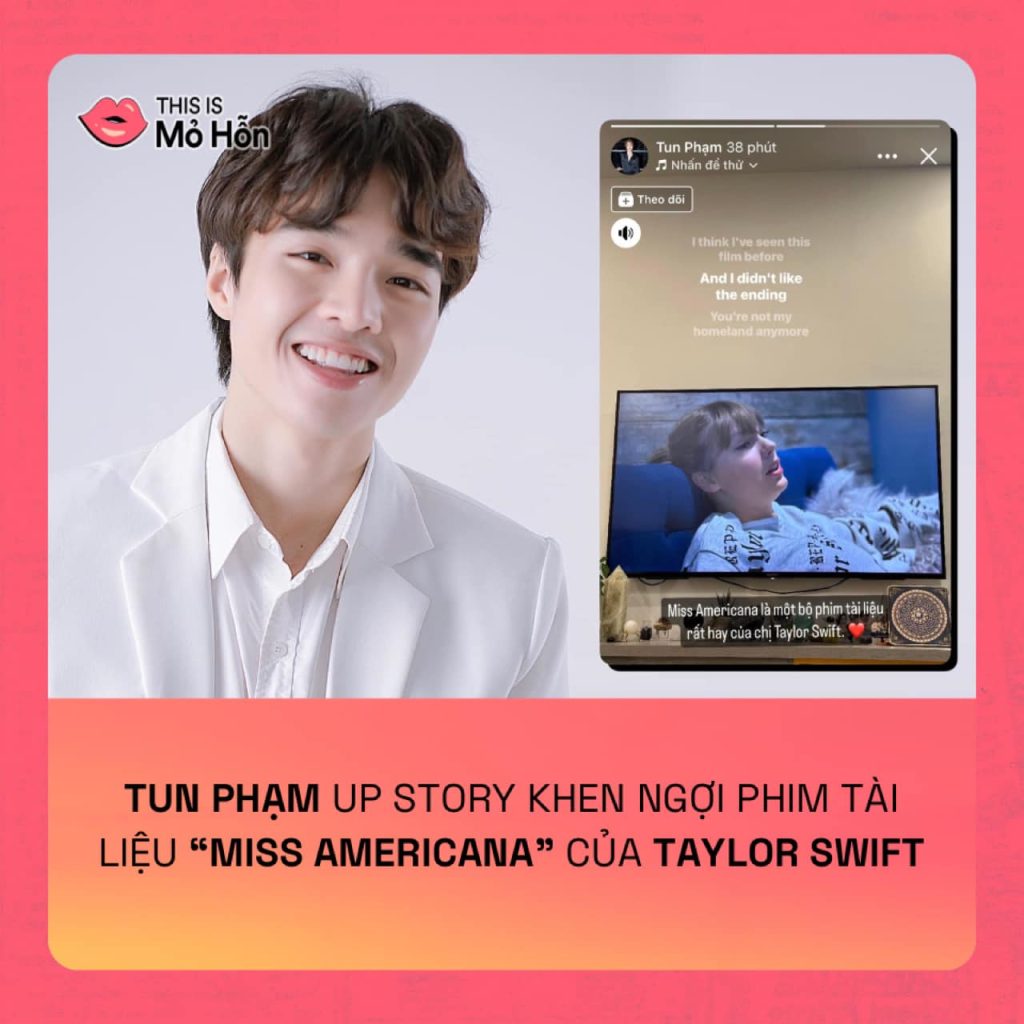
“You all keep laughing, and I’ve laughed too, but perhaps one day, he will come back with unexpected progress, and all those who hated him will turn into followers because this is the age of attention.
If not, it’s simply because he hasn’t developed, which is a loss for him, not anyone else. However, if Obito, after his performance in ‘Simple Love’ and ‘Rap Việt’ season 2, made a spectacular comeback with the album ‘Đánh đổi,’ then nothing is impossible.
Tomorrow will be a new day, just like any other day, because there’s always something like this on the front page.
Stay tuned for part 2: What to do when your idol is in trouble (part 2) – Allow me to neatly tuck away the posters of Thắng (Ngọt band), Nhã Nam publishing company, Han So Hee, and Nam Em into a corner.
Be Real in a Fake World,
Narcy Nguyễn.”
